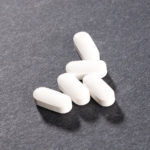By David Blyweiss, M.D.
You might not think it’s the most exciting nutrient on the planet. But if you aren’t getting enough, you’re asking for trouble.
What is this mystery nutrient? Fiber.
Many studies show that fiber works wonders in the body. It:
- Regulates blood sugar and reduces the risk of diabetes
- Lowers the risk of breast and colon cancer
- Protects against gastrointestinal problems like reflux, ulcers, irritable bowel syndrome and diverticulitis
- Helps lower cholesterol levels
- Cuts the risk of stroke
- Supports healthy blood pressure
- Encourages weight loss
That’s a pretty impressive list. But that’s not all fiber can do. In addition, the long-term Iowa Women’s Health Study found that women who ate four or more weekly servings of fiber-rich whole grains had 31% less risk of dying from inflammatory conditions other than heart disease.1
MD Exposes the Hidden Danger to Your Eyes

When your eyesight starts to fail, it's a real problem. Suddenly you can't go to the grocery store... you can't get to the doctor if you have an emergency... you can't meet your friends for dinner…
Your "regular" doctor doesn't have time to keep up with the latest research. And the same goes for eye doctors. They go to school to learn how to fit you for glasses and contacts, but have no way of preventing the damage and loss of eyesight that threatens your freedom and independence.
Let me show you something that explains a LOT about how your eyes work.
In my FREE Special Report, I'll show you a HUGE, untapped resource for your eyes that safely and naturally restores clear, effortless eyesight.
Click here to get started...
Found exclusively in plant foods, fiber is either soluble or insoluble. Soluble aids vital nutrient absorption by slowing digestion, and insoluble adds bulk to the stool, helping waste—and toxins—pass more quickly from the intestines. But to get these benefits, I recommend getting at least 30 grams of fiber every day.
Below you can see the fiber make-up of some foods.
Cereal grains – ½ cup cooked
| Soluble | Insoluble | |
| Barley | 1g | 4g |
| Oatmeal | 1g | 2g |
| Oatbran | 1g | 3g |
Seeds
| Soluble | Insoluble | |
| Psyllium seeds ground (1 Tbsp) | 5g | 6g |
Fruit (1 medium fruit)
Are You Suffering From...
- Love handles and a pot belly
- Romance that isn't what it used to
- Forgetfulness and inattention
- Low (or no) strength and endurance
- A sex drive that's shifted into neutral...or worse
If so...you may have Mature Male Burnout. Click here to discover more about this unique condition and what you can do about it.
| Soluble | Insoluble | |
| Apple | 1g | 4g |
| Banana | 1g | 3g |
| Blackberries (½ cup) | 1g | 4g |
| Citrus Fruit (orange, grapefruit) | 2g | 2-3g |
| Nectarine | 1g | 2g |
| Peach | 1g | 2g |
| Pear | 2g | 4g |
| Plum | 1g | 1.5g |
| Prunes (¼ cup) | 1.5g | 3g |
Source: http://www.medicalnewstoday.com/
While both types are important, soluble fiber in particular has been shown to benefit healthy cholesterol. A recent study found that taking 6 grams daily of a specific type of oat fiber (oat beta glucan) reduced total and LDL cholesterol after just 6 weeks.2 Other research shows that a low saturated-fat diet supplemented with another source of soluble fiber, psyllium, also raised HDL (healthy) cholesterol.3
But here’s something you may not know—fiber doesn’t end with soluble and insoluble. There are actually seven types of fiber, each with its own function.
Brans, gums and mucilages help regulate blood sugar and lower cholesterol levels. They also help remove toxins from the body. You’ll find these types of fiber in oatmeal, oat and rice bran, sesame seeds and dried beans. Psyllium supplements also provide the same benefits with the convenience of a capsule or powder.
Cellulose is found in the skins of fruits and vegetables like apples, beets, broccoli, carrots, celery and pears. It’s also present in whole grains. And cellulose is an indigestible fiber. It helps keep you “regular”. Quite helpful if you suffer from hemorrhoids. Cellulose also removes cancer-causing substances from the colon.
Hemicellulose is another complex carbohydrate the body can’t digest. As it moves through the digestive system, hemicellulose absorbs water—helping to promote weight control and alleviate constipation. You can find it in apples, bananas, beans, corn, green leafy vegetables, pears and whole-grain cereals.
Lignan fiber is most abundant in flaxseeds but it’s also found in apricots, broccoli, cabbage, kale, sesame seeds, tofu and whole grains. Lignans support healthy cholesterol levels. Because it’s also a phytoestrogen, it may help ease the symptoms of menopause.
Pectin is probably one type of fiber you are familiar with. But, beyond its ability to thicken jams and jellies, pectin also helps control blood sugar by slowing the absorption of food after you eat. Find this soluble fiber star in apples, grapefruit, oranges and other fruits, as well as vegetables and legumes.
A nutritional supplement called modified citrus pectin, or MCP, is a form of pectin that has been molecularly altered to improve its bioavailability. Its potential benefits include removal of heavy metals from the body and cancer prevention.
The smartest way to take advantage of all of these beneficial fibers is by eating a variety of fresh fruits and vegetables, as well as beans, legumes and whole grains. It’s also smart to take a fiber supplement daily that contains one or more of these specialized fibers. Just make sure that you take your supplement with plenty of water.
It’s also a good idea to take it separately from your other supplements or medicines so that the fiber doesn’t interfere with their absorption.
References:
- Jacobs DR Jr. Whole-grain consumption is associated with a reduced risk of noncardiovascular, noncancer death attributed to inflammatory diseases in the Iowa Women’s Health Study. American Journal of Clinical Nutrition. 2007;85:1606-1614.
- Queenan KM. Concentrated oat beta-glucan, a fermentable fiber, lowers serum cholesterol in hypercholesterolemic adults in a randomized controlled trial. Nutrition Journal. 2007;6:6.
- Giacosa A. The right fiber for the right disease: an update on the psyllium seed husk and the metabolic syndrome. Journal of Clinical Gastroenterology. 2010;44 Suppl 1:S58-60






